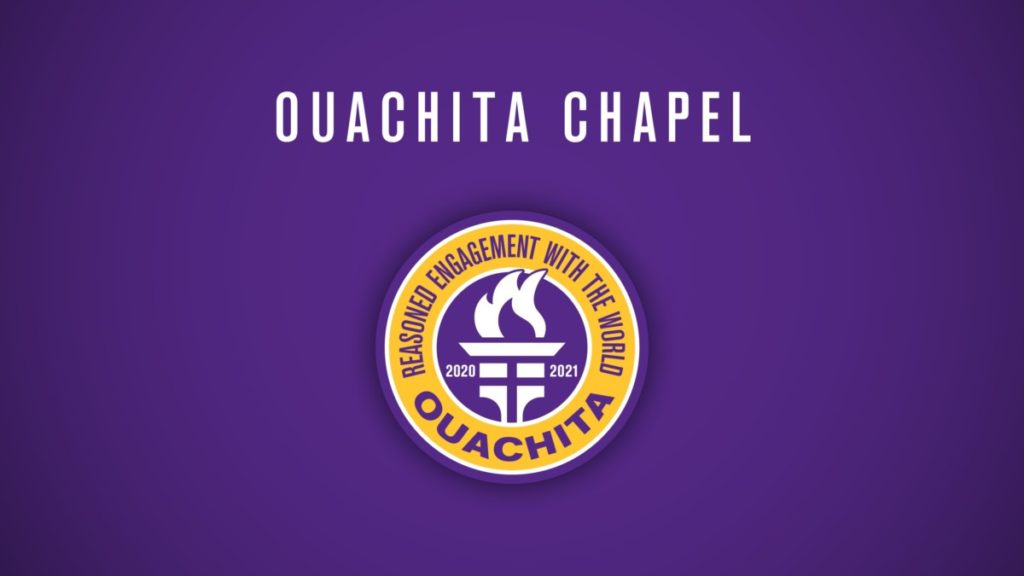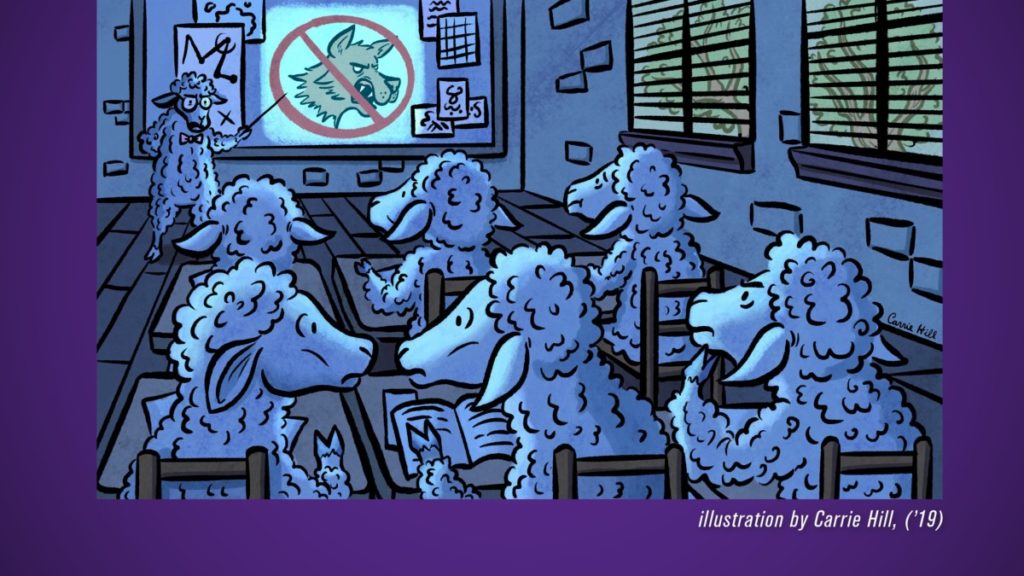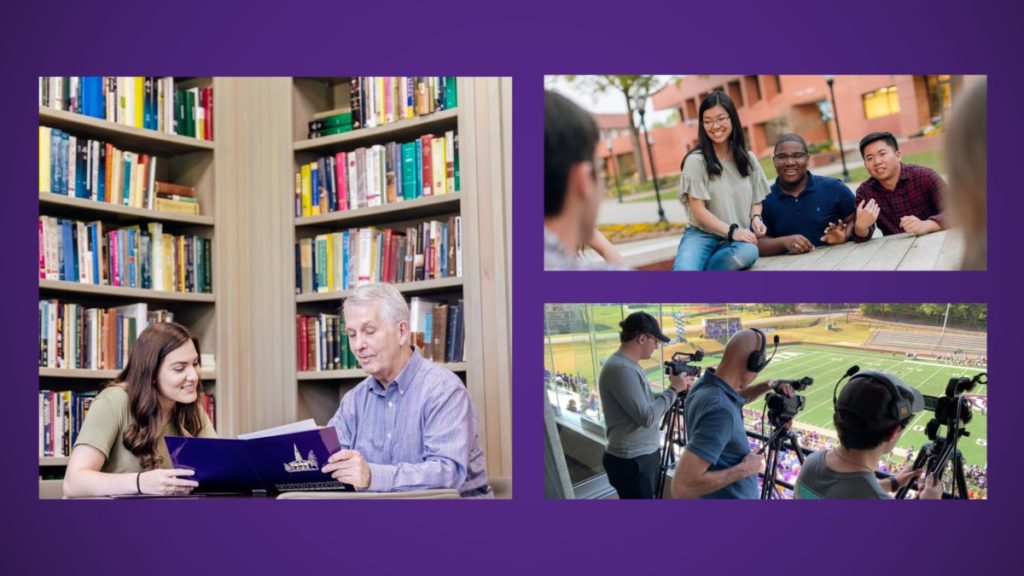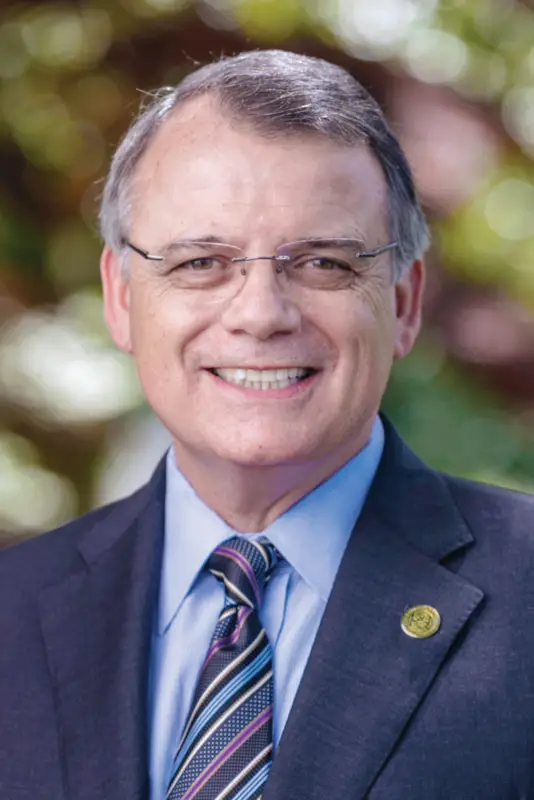At the beginning of each academic year, I address Ouachita’s entire student body, as well as faculty and staff, at Convocation, which also serves as our first Chapel service. What follows is an excerpt from this year’s address, which was delivered by video this year due to the pandemic.

Three years ago, I began using the university’s vision and mission statements to emphasize an annual theme to help us focus on key Ouachita outcomes. We take these statements seriously, and they’re the foundation of your Ouachita education and experience. Each year we give a patch with the theme to students, faculty, and staff. I put the patches on my backpack, and I can’t help but smile when I see students displaying their patches. This year, we will focus on reasoned engagement with the world.
Our goal as Christian university is to prepare our students to be better – to be more skilled – in reasoned engagement with the world. What do we mean by that?
Let’s begin by thinking of it this way: We came into this world ready to learn. For most of us, our five senses went to work absorbing every data point: hearing voices and noises, responding to human touch, seeing faces and light, tasting and smelling.
And the deluge of sensory data rolling through our operating systems has not slowed down. “Welcome to reality,” our senses told us and keep telling us, to this very second. There’s a lot of reality to grasp.
The Christian faith asserts that this reality is God’s reality. It is His world. We consume information, we relate to people, we try new things, we have experiences – over and over again – and it helps us understand and respond to the world.
To say it another way, when we talk about reasoned engagement with the world, we mean the reasoned judgments that each of us make about all the information, in the broadest sense, that comes to us.
Another example is as simple as passing a car on a two-lane road. Think of all the data you must consider in mere moments: the speed of the vehicle you will pass and those coming from the other direction, the distance of the passing zone, the passengers in your car, your previous experience passing cars, the meeting you for which you are late, the advice of your parents ringing in your memory and more.
So much information, and then the moment comes. Reasoned engagement with the world: Do you pass? All those experiences and decisions, over time, hopefully lead to you being a more skilled driver in that critical moment of engagement.
This example may be too simple, but I think it helps us understand the way reason – our intellectual judgments – helps us engage effectively and appropriately with the world around us.
So, you may be wondering, If you’ve been doing all this “reasoned engagement” automatically, what’s the point of college?
I recently heard someone explain it this way: “All sheep run away from wolves, but sheep don’t get together and have conversations about it.”

In other words, sheep won’t be in college this fall talking about their wolf issues, or their strategies for escape, or how sheep have historically or theologically considered their fears, or how they might scientifically assess the pros and cons of each option for escape.
But you and I? We have the capacity to reason our way through all the judgments from data that has come our way, both in our lifetime and in the long history of the world. And we have the capacity to talk about those judgments, to engage in a serious and deep examination of all such reason. So, we come to college to mature in our ability to reason.
At Ouachita, since 1886, we believe developing reasoned engagement with the world can be best realized in a tight-knit, Christian campus community where we live and learn together. We’ve purposely created an environment where students are given time to think, have conversations with those who have thought much longer about something than we have, listen to friends whose lives have given them very different data sets than we had growing up, experience high-impact educational opportunities outside the classroom, and more.
During your college years, your time studying, learning, talking, writing, exploring, questioning and serving will help you form more precise judgments about all the data that floods our lives. When you grow in your ability to reason, you will grow better at thinking about the realities of our world and become better thinkers about the God of the universe who created it.
We believe it’s essential to Christian maturity, of living out – being more faithful to, getting better at – loving the Lord with all our heart, soul, strength and mind. Your mind matters to God. Scripture tells us to “be transformed by the renewing of our mind. Then you will be able to test and approve what God’s will is – His good, pleasing, and perfect will.” (Romans 12:2)
But, there’s more to this part of our mission statement; reasoned engagement with the world means we learn how to move toward active participation in reality.
Or, said another way, all of our thinking leads to active engagement in God’s world. We need help walking through the flood of data and potential experiences that come our way, but we also need help walking through the tangle of ungodly systems and malicious forces that oppose God’s rule and reign in that world.
In the same way, intellectual engagement with God’s world must include being more faithful to and getting better at loving our neighbor. We fail profoundly when we think right thoughts but live with no regard for the poor, the lonely, the marginalized. As James reminds us in the New Testament, thinking brilliantly without doing good makes our faith worthless. (James 1:18-27)
When we pray the Lord’s prayer, “your kingdom come, your will be done, on earth as it is in heaven,” (Luke 11:2) we accept the Kingdom call to do all that we can to make our world look and feel and be more like heaven.
Chapel helps us in this process. Ouachita’s mission statement leaves no quarter for the separation of faith and reason. The Christian faith and our reason are never truly in conflict. There can’t be something that is true according to our faith and, at the same time, false according to reason or science since God is the source of all reality (a position Thomas Aquinas articulated in the 13th century).
There may be things that we do not yet understand – like COVID-19. Or things we will never fully understand – like why a parent abuses a child. But we work toward a reasoned engagement with all the realities of our world. We take its injustices and its sorrows and its viruses as legitimate areas of study even as we do biology and business and the works of Charles Spurgeon and Martin Luther King. And we do so trusting that truth is never subjective or purely personal. This is our Father’s world, and its realities are ultimately bound up in Him.
As Christian scholars, we refuse to be skeptics who claim that faith can’t be proved. We also resist those who say that all we really need for reasoned engagement with the world is to study the Bible. This is why Ouachita students take Bible courses at Ouachita but also classes in many other subjects. And it’s why we make Chapel a required part of the achieving a diploma. Faith and reason belong together.

It’s a very different year for all of us and so challenging in so very many ways: physical distancing, masks, virus fears and virus opinions, a divisive political environment in an election year, racial justice issues and global economic pressures. We all need large doses of humility and grace.
Yet, I can’t imagine a better time or a better place to develop our capacity for reasoned engagement with the world than in a community of Christians who are all making progress toward this goal. What a providential time to emphasize that piece of Ouachita’s mission.

